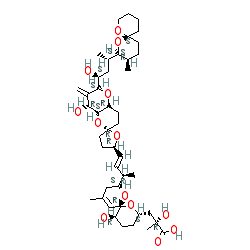GtoPdb is requesting financial support from commercial users. Please see our sustainability page for more information.
|
Compound class:
Natural product
Comment: Okadaic acid is a polyketide that was originally isolated from the marine sponges Halichondria okadaii and H. melanodocia, but was subsequently found to originate in marine plankton which are ingested by the sponges (and other bivalve filter-feeders). It is a toxin in humans, being the causative agent of diarrheic seafood poisoning following the ingestion of contaminated shellfish. Naturally occurring congeners of okadaic acid (acanthafolicin and dinophysis toxins 1-4) are equally potent toxins. Okadaic acid and related compounds inhibit human protein phosphatases PP1 and PP2A [1,3].
Ligand Activity Visualisation ChartsThese are box plot that provide a unique visualisation, summarising all the activity data for a ligand taken from ChEMBL and GtoPdb across multiple targets and species. Click on a plot to see the median, interquartile range, low and high data points. A value of zero indicates that no data are available. A separate chart is created for each target, and where possible the algorithm tries to merge ChEMBL and GtoPdb targets by matching them on name and UniProt accession, for each available species. However, please note that inconsistency in naming of targets may lead to data for the same target being reported across multiple charts. ✖ |
|
|||||||||||||||||||||||||||||||||||
| References |
|
1. Gauss CM, Sheppeck 2nd JE, Nairn AC, Chamberlin R. (1997)
A molecular modeling analysis of the binding interactions between the okadaic acid class of natural product inhibitors and the Ser-Thr phosphatases, PP1 and PP2A. Bioorg Med Chem, 5 (9): 1751-73. [PMID:9354231] |
|
2. McCluskey A, Keane MA, Walkom CC, Bowyer MC, Sim AT, Young DJ, Sakoff JA. (2002)
The first two cantharidin analogues displaying PP1 selectivity. Bioorg Med Chem Lett, 12 (3): 391-3. [PMID:11814804] |
|
3. Sheppeck 2nd JE, Gauss CM, Chamberlin AR. (1997)
Inhibition of the Ser-Thr phosphatases PP1 and PP2A by naturally occurring toxins. Bioorg Med Chem, 5 (9): 1739-50. [PMID:9354230] |






